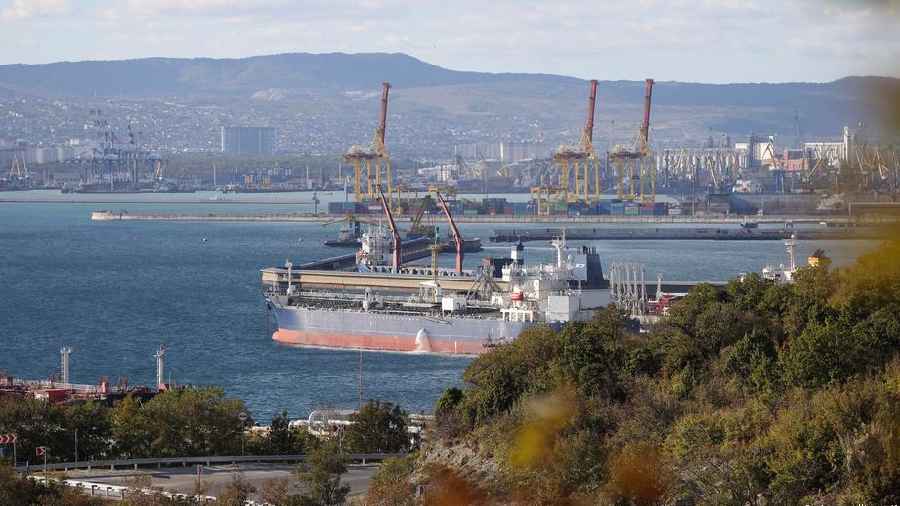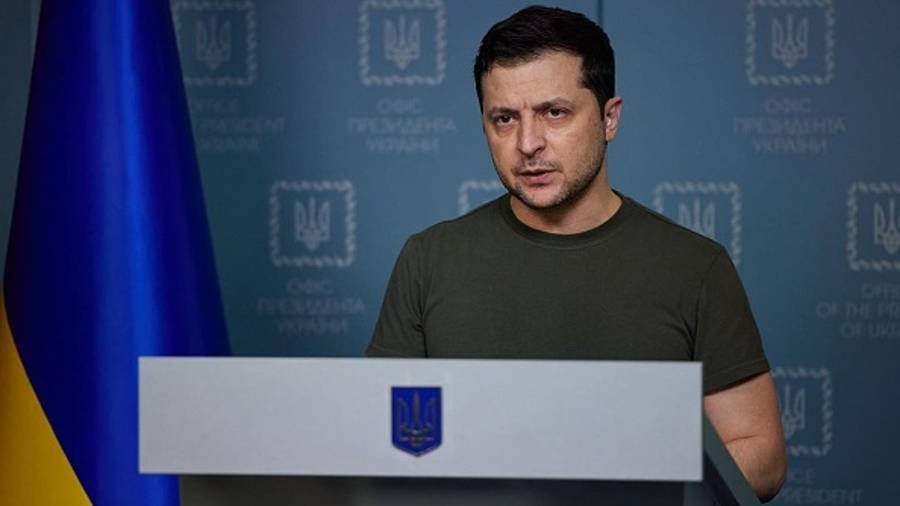The Group of Seven price cap on Russian seaborne oil set at $60 (€57) per barrel came into force on Monday as the West tries to limit Moscow's ability to finance its war in Ukraine.
The price cap, to be enforced by the G7, the European Union and Australia, comes on top of the EU's embargo on imports of Russian crude by sea and similar pledges by the United States, Canada, Japan and Britain.
It allows Russian oil to be shipped to third-party countries using G7 and EU tankers, insurance companies and credit institutions, only if the cargo is bought at or below the price cap.
Because the world's key shipping and insurance firms are based in G7 countries, the cap could make it difficult for Moscow to sell its oil for a higher price.
Russia, the world's second-largest oil exporter, said on Sunday it would not accept the cap and would not sell oil that is subject to it, even if it has to cut production.
Ukraine and allies rebuke Macron for suggesting 'security guarantees' for Russia
French President Emmanuel Macron's suggestion the West should consider Russia's need for security guarantees if Moscow agrees to talks to end the war in Ukraine unleashed a storm of criticism in Kyiv and its Baltic allies.
Ukrainian President Volodymyr Zelensky's top aide, Mykhailo Podolyak, said that it is the world that needs security guarantees from Russia, not the other way around. Zelensky has not commented on Macron's suggestion.
Oleksiy Danilov, the secretary of Ukraine's National Security and Defense Council, said a "denuclearized and demilitarized" Russia would be the best guarantee of peace not only for Ukraine, but also for the world.
Meanwhile, former Finnish Prime Minister Alexander Stubb said he "fundamentally" disagreed with Macron. "The only security guarantees we should focus on are essentially non-Russian," he said on his Twitter account. "Russia needs first to guarantee that it does not attack others."
And Lithuania's former foreign minister, Linas Linkevicus, said that Russia has security guarantees as long as it does not "attack, annex or occupy" its neighbors.
Zelensky urges Ukrainians to be united and resilient
Looking ahead to the coming cold season, President Volodymyr Zelenskyy has appealed to the Ukrainian people's perseverance and resilience in light of the ongoing Russian invasion of the country.
"The enemy very much hopes to use winter against us: to make winter cold and hardship part of his terror," Zelenskyy said in his daily video message. "We must do everything we can to survive this winter, no matter how harsh it is."
Enduring this winter, he said, meant enduring everything. Russia does have an advantage in missiles and artillery, the Ukrainian president said.
"But we have something the occupier does not have and will not have: We are protecting our home, and that gives us the greatest possible motivation," Zelensky stressed.
The Ukrainian people are fighting for freedom and defending the truth, he said. "To survive the winter, we must be more resilient and united than ever," Zelensky said in an appeal to Ukrainians.
Hundreds of towns, villages without power
Yevhen Yenin, Ukraine's deputy interior minister, said hundreds of villages and towns in eight regions across the country remained without power on Sunday after weeks of Russian airstrikes.
"The enemy continues to attack the country's essential infrastructure. Currently, 507 localities in eight regions of our country are cut off from electricity supplies," Yenin told Ukrainian television.
"The Kharkiv region is the worst hit with 112 isolated villages," Yenin added.
According to Yenin, 90 villages were left without power in the eastern Donetsk region and Kherson in southern Ukraine.
Ukrainians are fearing an especially tough winter as Russian strikes have targeted Ukraine's energy grid, and further attacks are expected.
Moscow has increasingly targeted energy facilities in Ukraine after suffering significant military losses on the ground.
According to Ukraine's energy operator DTEK, half of the country's energy grid remains damaged.
Russian rights organization: 'No diplomatic solution' with Putin in power
One of the co-founders of the Nobel Peace Prize-winning Russian rights organization Memorial believes there is no diplomatic solution to the war so long as President Vladimir Putin remains in power.
"I am absolutely convinced that there is not a diplomatic solution with Putin's regime, so long as it is still there," Irina Scherbakova said Sunday.
Her comments came as she was presented with another award in Hamburg, northern Germany, for her years of documenting Stalinist-era crimes and campaigning on rights issues in her home country.
German Chancellor Olaf Scholz awarded her the Marion Dönhoff Prize to Scherbakova, describing her as an ally in the fight for a "peaceful, free and democratic future for Europe."
Russia's war running at 'reduced tempo,' says US intel chief
The US director of national intelligence Avril Haines said fighting in Russia's war on Ukraine was slowing down and suggested that Kyiv could have better prospects in the coming months.
''Honestly we're seeing a kind of a reduced tempo already of the conflict,'' Haines said, adding that her team expected that both sides would look to regroup and prepare for a possible Ukrainian counter-offensive in the spring.
''But we actually have a fair amount of skepticism as to whether or not the Russians will be in fact prepared to do that,'' she said.
''And I think more optimistically for the Ukrainians in that time frame.''
Haines also said that Russian President Vladimir Putin was likely more aware of ''the challenges'' that his forces face, following allegations that his aides were shielding him from bad news.
German envoy expects more Ukrainian refugees in coming weeks
The German ambassador to the UK is predicting that a large number of refugees from Ukraine are likely to flee to Germany over the coming weeks.
Ambassador Miguel Berger told broadcaster Sky News that Moscow was terrorizing Ukrainians as it continued to target their country's energy infrastructure.
"We are very concerned about that, because these attacks on the energy infrastructure mean that many people in freezing temperatures might be forced to leave Ukraine. So, we expect another wave of refugees in the coming weeks," Berger said.
Berger added that he saw no grounds for optimism about ending the war by diplomatic means.
According to Germany's Interior Ministry, as of November 30, a total of 1,033,931 people fleeing the war in Ukraine entered Germany since Russia's invasion started on February 24.
UK points to waning public support for war in Russia
The British Defense Ministry's regular intelligence update said support from the Russian public for Moscow's war on Ukraine was "falling significantly."
"With Russia unlikely to achieve major battlefield successes in the next several months, maintaining even tacit approval of the war amongst the population is likely to be increasingly difficult for the Kremlin," the report said.
The update cited a recent report by an unidentified independent Russian media outlet that claimed to have access to data collected by Russia's Federal Protective Service.
"The data indicated 55% of Russians favour peace talks with Ukraine, with only 25% claiming to support continuing the conflict," the British ministry said.
Around 80% of Russians were in support of what the Kremlin calls a "special military operation" at the beginning of the war, the ministry added.
Moscow considers export ban to countries enforcing oil price cap
Alexander Novak, Russia's deputy prime minister, said Moscow was looking into banning oil supplies subject to a Western-imposed price cap.
The EU agreed a deal for a $60 (€57) per barrel price cap on Russian seaborne oil. G7 nations also adopted the measure.
Novak, who is in charge of Russia's energy supplies, said, "We are working on mechanisms to prohibit the use of a price cap instrument, regardless of what level is set, because such interference could further destabilise the market."
"We will sell oil and petroleum products only to those countries that will work with us under market conditions, even if we have to reduce production a little," he added.
Macron dismisses claims that sending arms to Ukraine weakens French defense
French President Emmanuel Macron defended Paris' decision to send weapons to Ukraine amid domestic criticism from right-wing nationalist figure Marine Le Pen.
Le Pen and other politicians have said that France could not supply Kyiv with arms at the expense of its own security.
"That is both false and dangerous," Macron told the Sunday edition of the newspaper Le Parisien.
"As commander-in-chief of the armed forces, I can assure you that always, when we supply something, we do so while maintaining our defense capabilities for our territory, our critical infrastructure and our citizens," he added.
Macron accused his longtime rival of being a friend of Russia and carrying on a "capitulation discourse."
The French leader said that supporting Ukraine was also "for the defense of our values and our freedom."
France has supplied Ukraine with 18 self-propelled howitzers. More weapons deliveries are planned.
More DW coverage on Russia's invasion of Ukraine
Russia continues to attack energy infrastructure in Ukraine, causing homes to lose power, heat and water. Experts say it's a cynical tactic with a long history.
Russian propagandists are constantly saying Ukraine is full of Nazis, and posting alleged evidence online. DW's fact-checking team has investigated some of this supposed evidence and found it to be baseless.












